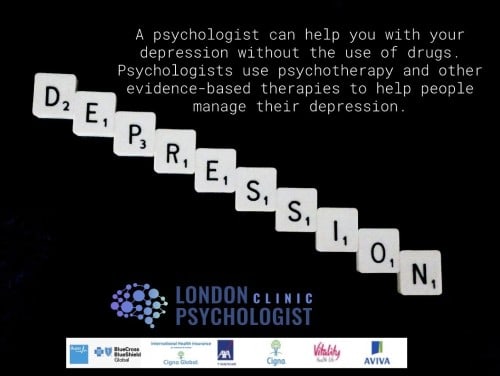Treat Depression without Drugs

posted 17th April 2023
What are the treatments for depression without drugs?
The signs and symptoms of depression vary from person to person, but some of the most common symptoms include:
-Persistent feelings of sadness, hopelessness, and/or emptiness
-Loss of interest or pleasure in activities once enjoyed
-Changes in sleep patterns, including insomnia or sleeping too much
-Fatigue and decreased energy
-Feelings of worthlessness or guilt
-Difficulty concentrating or making decisions
-Changes in appetite or weight
-Thoughts of death or suicide
What are the best treatments without drugs?
The best treatments for depression without drugs are cognitive behavioral therapy (CBT), exercise, and lifestyle adjustments.
CBT is a type of psychotherapy that helps people recognize and change negative thinking and behavior patterns.
Exercise can be helpful in improving mood and reducing symptoms of depression. Exercise releases endorphins, which are hormones that act as natural mood boosters, as well as provide a sense of accomplishment.
Making lifestyle adjustments such as getting enough sleep, eating a healthy diet, and staying connected with friends and family can also help reduce symptoms of depression. Additionally, engaging in activities that you find enjoyable, such as art, music, or hobbies can be beneficial.
Psychotherapy for depression, also known as talk therapy, can help individuals to understand their feelings and develop healthier coping strategies. During psychotherapy, individuals can learn to manage their symptoms, better understand their thoughts and feelings, and develop strategies for dealing with life's challenges. Psychotherapy can be used alone or in combination with other treatments such as lifestyle changes. Types of psychotherapy for depression include cognitive behavioral therapy, interpersonal therapy, and psychodynamic therapy.
Psychodynamic therapy can help individuals with depression to better understand their thoughts and feelings and develop healthier coping strategies. During psychodynamic therapy, the therapist will help the individual explore their past experiences and relationships to gain insight into their current behavior. This type of therapy can help individuals identify and address unconscious conflicts contributing to their depression. It can also help individuals develop healthier ways of relating to the world and ultimately lead to improved mood and functioning.
Cognitive Behavioral Therapy (CBT) and cognitive restructuring are two types of psychotherapy that can help individuals with depression. CBT focuses on changing negative thought patterns and behaviors that are contributing to depression. Cognitive restructuring is a type of therapy that helps to identify and modify distorted thought patterns and assumptions that may be contributing to depression. Both techniques can help individuals to better understand their feelings and develop healthier coping strategies to manage their symptoms.



